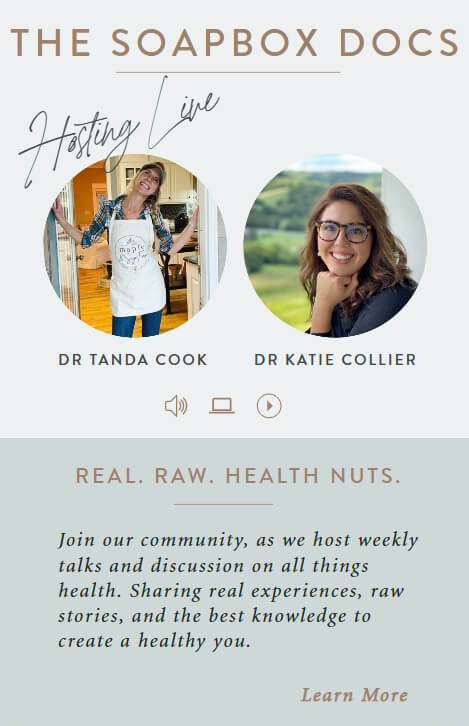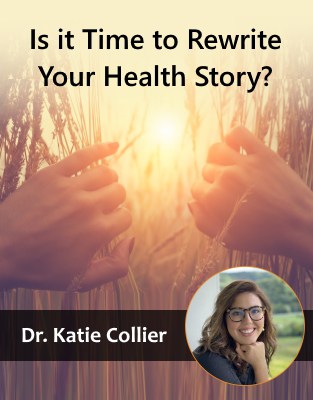“Chronic illness – mental or physical – is to a large extent a function or feature of the way things are and not a glitch; a consequence of how we live, not mysterious aberration.” Gabor Mate, The Myth of Normal
The myth of modern medicine is that your health is deteriorating on accident, by coincidence, at the mercy of your genetics.
From this perspective it is easy to see how so many patients land in my practice feeling defeated, disempowered, and at war with their bodies.
Yet, the truth of the matter is that your body wants to heal. It’s designed to heal. In fact, it will go to great lengths to compensate, reallocate energy, and limp along to avoid being out of balance.
The study of epigenetics, literally translating to “before genes,” outlines more clearly than ever before the impact that our environment has on our systems. It explains why one person with the genes for breast cancer will develop the disease, and someone else with the same genes will never get sick. What triggers these genes “on” or “off” is the environment, both internal and external.
This perspective is much more empowered, because you can’t change your genetic makeup, but you CAN change your environment. And when the environment fosters health, you will be healthier.
The undeniable truth is that we will all age. But we don’t all have to get sick.
Take a look at the daily habits that make up your life, are they setting you up to win? Do you like the trajectory of the path you are on?
If the answer is no, then I encourage you to keep reading.
When you focus on the pillars of health, as I will outline below, you will begin to change the internal and external environment toward one of healing, repair, and vitality. Promise.
Find Pleasure in Food
There are a few places spread across the globe that house the world’s longest-living, healthy populations that are referred to as the Blue Zones. Naturally, in an attempt to find out why these people live longer with dramatically less rates of chronic disease, these Blue Zones have been observed to determine what behaviors lead to such vitality. Paramount to these communities is their relationship to food. And I’m not simply talking about the actual content of their diet, though they do eat mostly whole foods and consume copious amounts of garden vegetables, they also prioritize the pleasure of food.
Yes, food is information and undeniably powerful in keeping us well. But, it’s also community, connection, celebration, delicious, and pleasure.
To prioritize the pleasure of food we can all learn from the people of the Blue Zones where they prepare and dine with loved ones, they take their time to connect and share stories of the day with those closest to them, savoring each bite and nourishing their body with foods that make them FEEL their best.
The nutrient dense diets they consume are not borne from restriction and fear but from the want to feel their best so that they can live vibrantly, passionately, and soak up all that life has to offer.
Sitting is the New Smoking
In all of history, human beings have never been as sedentary as we are today. The average American sits upwards of 8-10 hours per day and if you work a desk job chances are you are sitting for even longer hours.
The great news is that there is more research emerging that favors the use of “exercise snacks” to build more movement into your day without the need to slave away for hours at the gym. In fact, what the Blue Zones all have in common is that they don’t necessarily engage in formal exercise, but their lives are set up to foster movement every 20 minutes or so. This can include household chores, walks, mowing the lawn with a push mower, dancing, playing with children or animals, taking the stairs, or simply making a meal.
The more movement you can incorporate into your day, the better. I’m in no way suggesting you give up your daily workout, if you already have a regular exercise routine, as vigorous physical exercise is associated with decreased risk of developing chronic disease and all-cause mortality. Yet, binging on exercise for one hour per day does not compensate adequately for 10 hours of sitting.
Try setting an alarm as a reminder to stand up, do some air squats, take a walk or dance it out throughout the day. Or better yet, buy a stand-up desk so that you can refrain from sitting while you work.
Hydrate
You can live much longer without food than you can without water, which illustrates the importance that being properly hydrated has on your health.
Water should be the predominating beverage that you consume daily, and the amount to maintain hydration is probably more than you think.
It’s recommended that you drink ½ your body weight in ounces per day. So, if you are a 150 lb adult, you would need to drink 75oz per day to avoid dehydration.
What counts as water? Water, and non-caffeinated herbal tea.
Drinking all the water and still thirsty? Try supplementing with trace minerals and adding a pinch of salt to your water to replenish electrolytes.
Letting Go
Your body is a detoxing machine.
The organs of elimination are the digestive tract and liver, kidneys, lungs, skin and lymph. And though your body is designed to detox, and does so every single day without your knowledge, we ask a lot of our detox pathways.
From the products you slather on your skin, the air you breath, the food you eat, the water you (don’t) drink, and the medications you take, you rely on your detox pathways to help you clear out toxins and debris to maintain health.
The problem is that most of us have sluggish detox pathways because we a) have a high toxic burden and b) are not supporting these organs so that they can optimally do their job.
How do you know if your detox organs are sluggish? Ask yourself these simple questions:
Am I pooping every day?
Am I drinking half my body weight in ounces of water per day?
Am I sweating daily?
Am I taking 100 conscious deep breaths a day?
If the answer to any of these questions is no, then you have some room for improvement in supporting these organs of elimination.
Some common signs and symptoms of impaired detox pathways are hormonal imbalances, headaches, skin concerns, digestive concerns, autoimmune disease, and much more.
Castor oil packs, dry skin brushing, supplementing with milk thistle and B-vitamins are great ways to upregulate detoxification and put you on the path to feeling better.
Breathe
The world is stressful.
And because the world is stressful, we rely heavily on our stress response, namely cortisol, to get through the day. While acute stress in the face of danger or injury is profoundly healing, chronic stress is debilitating to the body.
The goal is not to remove all stress from your life. That would be impossible. But what is possible is that you can learn tools to help alter your RESPONSE to stress.
What’s one FREE way to lower your cortisol? You guessed it: deep breathing.
Not only is it free, and available to you anywhere at any time, it’s also incredibly effective at stimulating the vagus nerve which is largely responsible for moving you out of the sympathetic, fight or flight nervous system and into the parasympathetic, rest and digest nervous system.
Healing is very challenging with elevated cortisol as it dampens the immune system. So, in order to ramp up the immune response and maintain health, it’s critical that you learn to shift into the parasympathetic nervous system.
I recommend people aim for 100 deep breaths per day.
Have you taken a deep breath today? One that fills up the lungs completely, breathing space into the torso?
Try it with me now. I’m serious. Breath in on a count of 1-2-3-4, pause at the top for 1-2, and exhale on a count of 1-2-3-4-5-6.
Prioritize Sleep
Sleep is possibly the single most important factor in maintaining optimal health, yet so many people aren’t getting enough of it.
According to the CDC, 1 in 3 Americans are getting insufficient sleep and reports insufficient sleep as a public health epidemic.
The risks of not getting enough sleep are nothing to scoff at, either. Reduced sleep leads to increased risk for cardiovascular events, stroke, Alzheimer’s disease, depression, anxiety, increased risk of injury, and cancer.
In fact, according to the WHO, working the night shift is defined as a Class 2A carcinogen or “probably carcinogenic to humans.”
This is because our physiology is tightly regulated by the circadian rhythm, as sleep is a time for rest, repair, regeneration, and healing.
Without adequate sleep, the body does not undergo the deep cleaning and repair necessary to clear out metabolic waste and toxins which ultimately leads to various chronic diseases.
To ensure you’re getting optimal sleep follow the tips below
- Sleep in a cool, dark room
- Sleep 7-9 hours per night
- Avoid light, especially blue light, 2 hours before bed
- Avoid eating or exercising 3-4 hours before bed
- Practice stress management to lower cortisol
- Get 20 minutes of direct sunlight exposure first thing in the morning
- Adopt a diet rich in micronutrients and phytochemicals
Nurture your Inner Child
I would be remiss to not discuss mental and emotional health when considering determinants of health.
To discuss the health of the body and mind separately fundamentally ignores that they are two components of the same system, each in constant communication with the other.
Your brain processes over 70,000 thoughts per day and thoughts produce physiological changes. That’s why thinking about a stressful situation from the past or one that might happen in the future, can make your breath shallow and your heart beat faster in the present.
Thoughts are not inert.
Very often our patterns of thought are informed by early life experiences. As our brains and nervous systems develop, we create meaning about the world, and about ourselves. This scaffolding upon which we build our lives impacts both our internal and external environments.
Taking time to examine the narratives you hold about yourself and the world is healing. It’s healing the parts of you that have been ignored, the parts of you that feed the negative self-talk, the parts of you that you keep hidden from the world, or maybe even from yourself.
It’s bringing these parts of you into the light, where you can see them, and you as you are, not as you’ve been conditioned to believe. It’s allowing the warmth of the sun to soften your edges and melt the ice cap on your heart.
And in return you heal from the inside out, you change the narrative, you change the trajectory of your life, and your health.
I ask each of my patients what they do for play, and I’m met with crickets on the other end of the phone.
We’ve been taught to grow up, and get serious, and in return we’ve lost our levity.
Joy must be felt in the present moment, it’s not an emotion we can conjure up through memory, like happiness.
So find the things that bring you joy, and do them every day.
If you don’t know what brings you joy, start by looking at the children: run around, swing on a swing set, look up at the clouds and make up stories.
Nurture the child in you to hold on to your youth.
References
https://www.ncbi.nlm.nih.gov/pmc/articles/PMC5859128/
https://www.ncbi.nlm.nih.gov/pmc/articles/PMC4400203/?utm_source=sleepauthority&utm_medium=content&utm_campaign=brand
https://www.ncbi.nlm.nih.gov/pmc/articles/PMC2908954/
https://www.ncbi.nlm.nih.gov/pmc/articles/PMC6125071/



